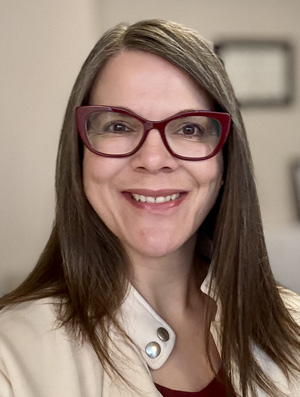Margaret Clarke, PhD
Assistant Professor of Couple and Family Therapy

Hope is the belief that change is possible. A skillful counsellor can lend hope when clients are short on their own. (Miller, W. and Rollnick, S., Motivational Interviewing, 3rd Edition)
[javascript protected email address]
Margaret Teaches:
- CO 703 Counselling Problems and Procedures
- CO 720 Approaches to Supporting Clergy Well-Being
- CO 790 Counselling Practicum I
- CO 791 Counselling Practicum II
- CO 819 Counselling Specialty: Motivational Interviewing
- PSY 701 Psychological Research Methods
Teaching Philosophy
As an educator I strive to be collaborative, developmental, and aware of the needs of adult learners. I see my role as both a facilitator of knowledge and also a mentor in the counselling profession. I hope to provide students with both a solid theoretical foundation as well as practical skill development. I love equipping students to be excellent counsellors!
Background
I have over 20 years of experience in the counselling field, having served in a variety of counselling, leadership, research and education roles. I describe myself as a systemic, person-centered therapist who employs a variety of therapeutic methods, such as family therapy, motivational interviewing and cognitive behavioural therapy. I am a Clinical Fellow and Approved Supervisor with the American Association for Marriage and Family Therapy (AAMFT) and Registered Marriage and Family Therapist and an Approved Supervisor with the Canadian Association for Couple and Family Therapy (CACFT). I am also a Registered Counselling Therapist with the Association of Counselling Therapy of Alberta and a member of the Motivational Interviewing Network of Trainers.
Education
PhD, Educational Administration - University of Saskatchewan (2021)
MA in Marriage and Family Counselling - Briercrest Seminary (2005)
Associate in Ministry Diploma - Canadian Bible College (1995)
Research
Resilience
Well-being
Therapy
Clergy
Publications
Peer Reviewed Publications
- Clarke, C. B., Berg, S., & Clarke, M. A. (2024). Prioritizing LGBTQ clients’ mental health: How Christian therapists resolve internal conflicts to remain ethical. Journal of Psychology and Theology. 00916471231221106
- Squires, V., Clarke, M. & Walker, K. (2023). The teacher resilience model: A framework to understand the balancing of adversity and supportive resources. Educational Researcher Journal. 51(2), 49-64.
- Clarke, M. A., Walker, K. D., Spurr, S., & Squires, V. (2023). Role-related stress and adversity impacting Christian clergy resilience: A pan-Canadian study. Journal of Pastoral Care & Counseling, 77(1), 51-63.
- Clarke, M. A. (2023). The Clergy Resilience Model: A tool for supporting clergy well-being. Journal of Psychology and Theology, 51(2), 239-250.
- Clarke, M., Spurr, S., & Walker, K. (2022). The well-being and resilience of Canadian Christian clergy. Pastoral Psychology, 71(5), 597-613.
- Clarke, M. A., Walker, K. D., Spurr, S., & Squires, V. (2022). Clergy resilience: Accessing supportive resources to balance the impact of role-related stress and adversity. Journal of Pastoral Care & Counseling, 76(3), 210-223.
Non- Peer Reviewed Publications
- Pagens, C. & Clarke, M. (2024). Ch. 4: Supporting Student Wellbeing During Graduate Internships. In Walker, K. & Kutsyuruba, B. (Eds.), Striving for Wellbeing in Higher Education Settings.
- Clarke, M. (2022). Supportive congregations: What can churches and congregants do to help support their pastors’ well-being and resilience. Faith Today, Jan/Feb, p. 38.40.
- Clarke, M. (2021). Understanding clergy resilience: A mixed methods research study. University of Saskatchewan.
- Clarke, M. (2021) Executive summary: Understanding clergy resilience.
- Clarke, M. (2005). A study of the roles and interactions of pastors and elders in the Christian and missionary alliance in Canada. Briercrest Seminary.
